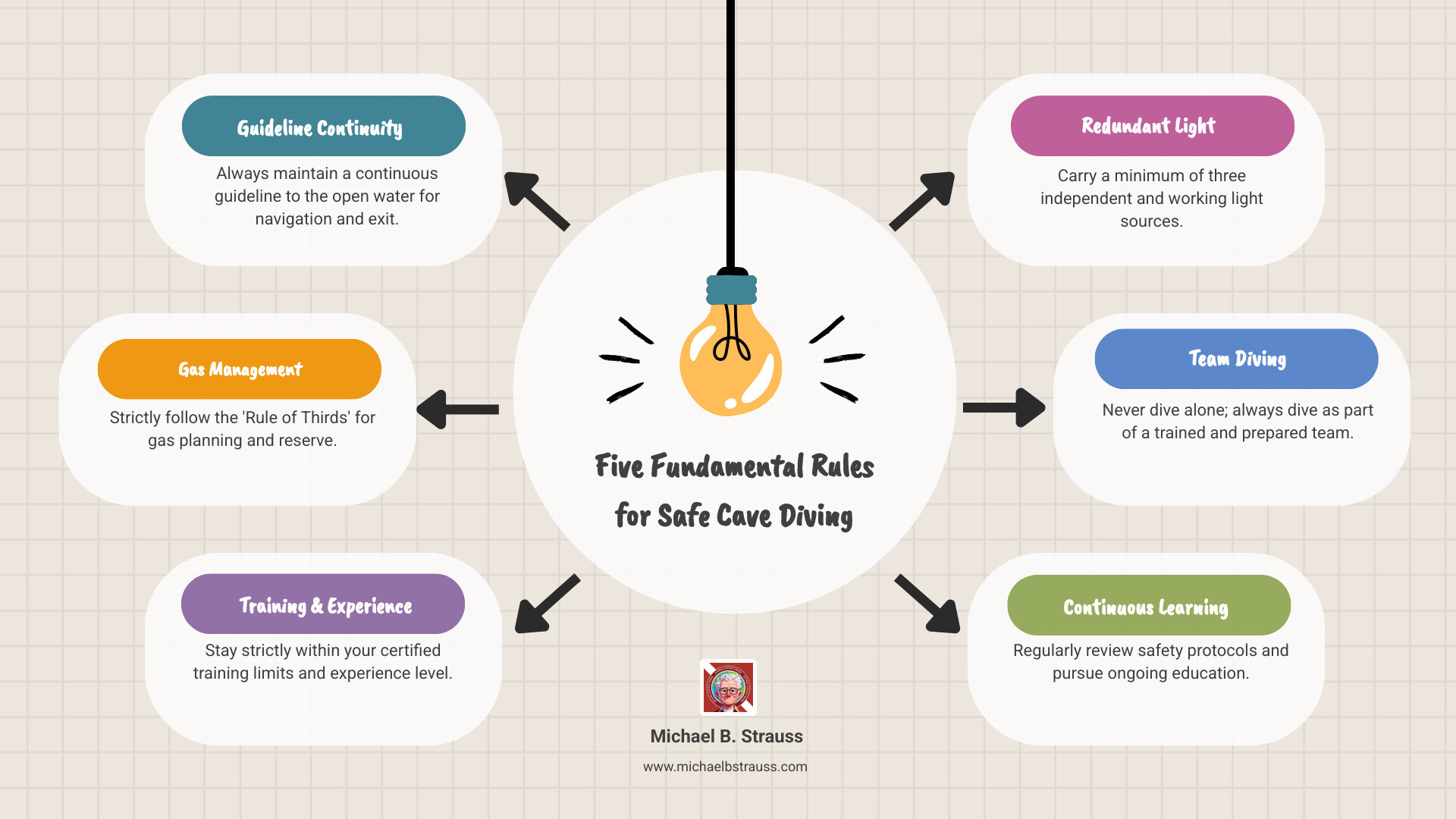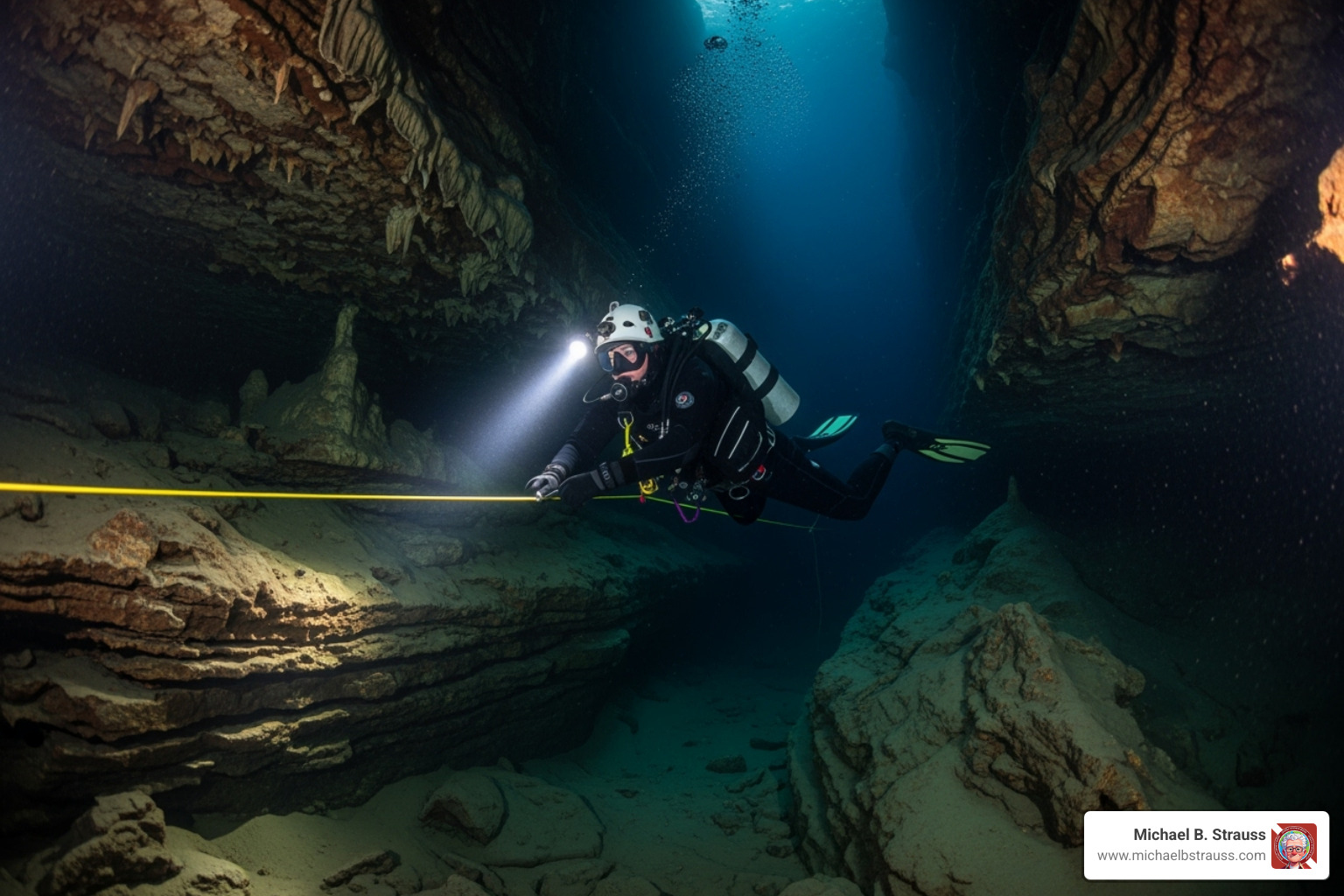Journey into the Overhead Environment
The best cave diving books combine essential safety knowledge, technical expertise, and inspiring real-world stories to prepare divers for one of the most challenging underwater environments. Cave diving represents the ultimate test of underwater skills and mental preparation. Unlike open water diving, the overhead environment eliminates direct access to the surface, making knowledge and proper training literally matters of life and death.
Selecting the right literature is critical, as it should serve three key purposes:
Technical Foundation - The best instructional books establish the fundamental safety rules that are the cornerstone of modern cave diving.
Real-World Application - Compelling trip narratives show how theory translates to actual diving situations, offering lessons in problem-solving and perseverance.
Scientific Understanding - Works by diving medicine experts, such as Dr. Michael B. Strauss, provide the deep physiological knowledge needed for safe technical diving.
Whether you're preparing for your first cavern course or expanding your technical diving library, the right books can illuminate the path to safer, more confident cave diving.

Best cave diving books definitions:
A Curated Library of the Best Cave Diving Books
Foundational Texts: Learning from the Experts
When you're ready to build a solid foundation in cave diving knowledge, certain books stand out as essential reading. The best cave diving books don't just teach techniques – they pass down wisdom from decades of research and exploration.
Dr. Michael B. Strauss's Diving Science deserves a place on every serious diver's bookshelf. While it covers all aspects of diving, its comprehensive approach to diving physiology and safety makes it invaluable for understanding the science behind safe cave diving. Dr. Strauss's work shines when it comes to accident analysis, helping us learn from past incidents so we don't repeat them. This scientific foundation helps you understand the "why" behind every safety rule. For additional safety resources, organizations like the Divers Alert Network (DAN) provide excellent support for the diving community.
Foundational texts provide essential historical context, showing how cave diving evolved from a dangerous trip into a calculated exploration. They trace the development of safety protocols and equipment that transformed cave diving from a high-fatality activity into a manageable risk sport.
Gripping Narratives: True Stories of Exploration and Survival
Sometimes the most powerful lessons come wrapped in compelling stories. The best cave diving books in this category don't just entertain – they teach through real-world accounts of triumph, tragedy, and the incredible human spirit that drives exploration.
These narratives offer an intimate look at the life of an explorer. Stories of navigating uncharted passages and facing life-threatening situations provide invaluable insights into the psychological demands of extreme diving. These experiences show us what it truly means to push boundaries while maintaining safety standards.
Many books explore risk, determination, and the drive to uncover hidden secrets, mirroring the cave diving experience perfectly. Other narratives tackle contemporary challenges, examining the human factors that can lead to accidents in extreme environments. Similarly, books about major cave rescue operations showcase the incredible skill and courage required in emergencies.
These accounts of exploring vast, deep cave systems—with their skyscraper-deep shafts and stadium-sized chambers—demonstrate both the allure and the extreme dangers of deep cave exploration. These narratives serve as more than entertainment. They're case studies in decision-making, risk assessment, and the profound connection between divers and the underwater world.
The Mind of a Diver: Psychology, Risk, and Human Factors
Cave diving success depends as much on mental preparation as technical skill. The best cave diving books addressing psychology and human factors explore the critical mental aspects that can make the difference between a safe dive and a dangerous situation.
Dr. Michael B. Strauss's extensive work in diving medicine emphasizes how understanding human physiology and psychology directly impacts safety. His research into accident analysis reveals that many diving incidents stem from psychological factors rather than equipment failures. Managing stress, maintaining situational awareness, and making sound decisions under pressure become life-or-death skills in an overhead environment.
Books focusing on human factors in diving teach us to recognize and address the mental pitfalls that lead to accidents. They explore how stress affects performance and the importance of team communication. Understanding these psychological aspects helps build the mental resilience needed for challenging environments. The key is developing a "risk management mindset," which means internalizing principles of self-awareness and proactive problem-solving.
Advanced Knowledge: Essential Reads for Technical Divers
As you progress beyond basic cave diving, specialized knowledge becomes crucial for safe exploration. The best cave diving books for advanced technical diving dive deep into complex topics like decompression theory, rebreather operations, and mixed gas procedures.
Dr. Michael B. Strauss's work on Decompression Science provides essential understanding of the physiological challenges in extended and deep dives. Grasping how gases behave under pressure and various decompression algorithms becomes non-negotiable for safe technical diving. His scientific approach helps divers understand the principles behind the complex planning software they rely on.
Specialized texts make complex topics like decompression theory accessible, explaining how to minimize decompression stress and manage oxygen exposure. Rebreather diving introduces new complexities that require dedicated study, demanding a thorough understanding of scrubber technology, oxygen monitoring, and emergency procedures. Advanced planning, contingency planning, and procedures for complex mixed gas dives are also covered in detail in high-quality technical diving literature.
Our Top Pick for the Best Cave Diving Book for Beginners
For any diver looking to explore overhead environments, building a solid foundation in diving science is the most critical first step. While practical instruction is irreplaceable, the right book can provide the essential "why" behind every safety rule and procedure.

Our top recommendation is Dr. Michael B. Strauss's Diving Science. This book is essential because it focuses on the scientific principles that govern safety in any underwater environment, especially challenging ones like caves. Understanding the physiological effects of pressure, gas mixtures, and decompression is not just for technical divers; it's fundamental knowledge for anyone who wants to dive safely.
What makes this book particularly valuable is its focus on accident analysis and human factors. It helps new divers understand not just what to do, but why it's crucial for their survival. By starting with a deep understanding of diving science, a beginner is far better equipped for the challenges ahead. This approach creates divers who don't just follow rules, but understand them deeply enough to make sound decisions in complex situations.
Why These are Considered the Best Cave Diving Books
The best cave diving books earn their reputation by meeting specific criteria that make them invaluable for education, inspiration, and practical application. These books don't just contain information – they shape competent, responsible divers who can explore safely.
Historical context forms the foundation of these exceptional books. The best literature chronicles how cave diving evolved from a highly dangerous activity into a calculated exploration sport. Understanding this history helps us appreciate why current safety protocols exist.
Technical accuracy remains non-negotiable. Whether covering rebreather mechanics or decompression theory, the information must be precise and reliable, drawing on scientific research and decades of collective experience.
Real-world application separates great books from merely good ones, bridging the gap between abstract concepts and practical challenges.
Inspirational stories play a crucial role. Gripping narratives of exploration and survival motivate divers while subtly teaching lessons about perseverance and problem-solving.
A consistent safety-first mindset runs through all top recommendations. Every piece of advice and technical explanation ultimately aims to make diving safer. Key takeaways consistently reinforced include the Rule of Thirds for gas management, guideline skills for navigation, comprehensive gas management, team diving protocols, and stress management techniques.
Conclusion: Your Next Chapter in Underwater Exploration
Your journey into cave diving doesn't end with closing the cover of your first book – it's just the beginning of a lifelong trip in learning. The best cave diving books we've explored together form more than just a reading list; they're your trusted companions for every stage of your underwater exploration.
Continuous learning isn't just a nice-to-have in cave diving – it's absolutely essential for your safety and success. Think of reading as the perfect partner to your hands-on training. While your instructor teaches you the physical skills in the water, these books work quietly in the background, building that crucial mental foundation.
The wisdom packed into these pages comes from diving pioneers who wrote the rules that keep us safe today, and from modern explorers who continue pushing boundaries. Experts like Dr. Michael B. Strauss bring the scientific rigor that helps us understand not just what to do, but why we do it.
Dr. Strauss's work in diving science is particularly valuable because it bridges the gap between theory and practice. When you understand the physiological demands your body faces in an overhead environment, those safety protocols start making perfect sense. It's the difference between following rules blindly and making informed decisions based on solid scientific understanding.
As you prepare for your own trips in the depths, knowledge truly is your most powerful tool. The overhead environment is unforgiving, but it's also incredibly rewarding for those who approach it with proper preparation and respect. These books help ensure that your explorations are not just thrilling, but safe and successful too.
DISCLAIMER: Articles are for "EDUCATIONAL PURPOSES ONLY", not to be considered advice or recommendations.
Ready to dive deeper into the science behind safe diving? Get your copy of Dr. Strauss's essential book here: https://www.bestpub.com/view-all-products/product/diving-science-revisited/category_pathway-48.html







